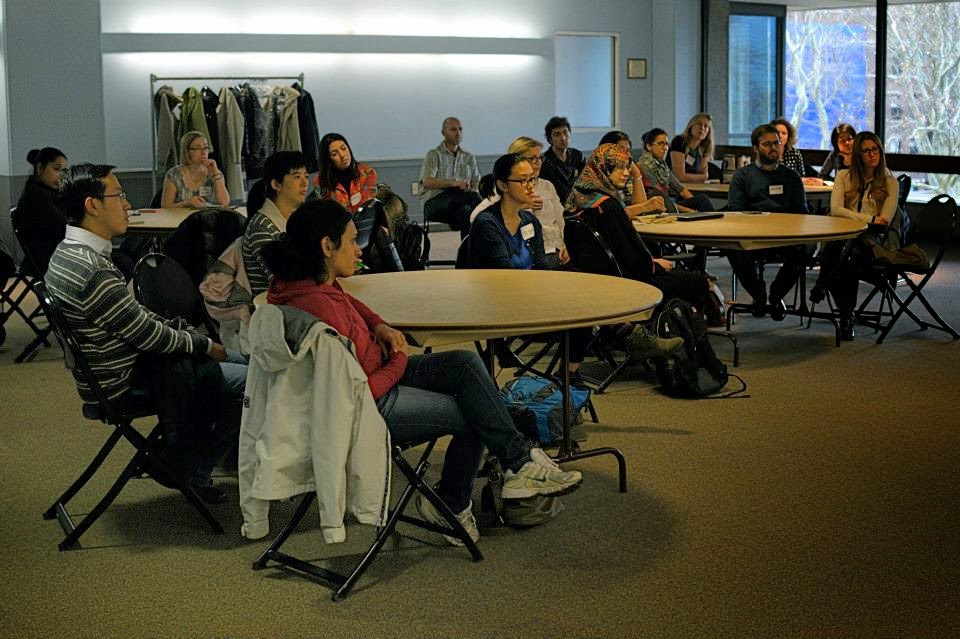
by Lisanne Stoop
A valuable glimpse inside the minds of recruiters and hiring managers
by Lisanne Stoop
On November 25th, a group of MIT spouses&partners had an amazing opportunity to gain a unique insight into the minds of recruiters and hiring managers. During the recruiter/hiring manager panel, Jamie Blumenthal (Corporate Recruiter at Stax), Mark Rowen (Area Manager for Salvatore Ferragamo) and Kristen Morreale (HR Staffing Services at MIT) answered all our questions on the recruiting and hiring process, including on resumes, covers letters, LinkedIn, and interviewing.
What you need to know about the recruiting and hiring process
In general, the recruiting and hiring process runs as follows: the recruiter reviews all received resumes and cover letters and selects the candidates which are best suitable for the position. These candidates are then presented to the hiring manager, who decides who will be invited for an interview. During the remainder of the process the recruiter will keep in touch with you to inform you about the next steps and answer any questions about the position or the interview(s).
So, why does this process often take so long? You are obviously not the only one applying for the job. For some open positions, recruiters even receive up to 600 resumes and cover letters. As you can imagine, it is a challenging job for the recruiters to read all of those resumes and cover letters in such a small period of time. Besides, each hiring manager creates their own search team, including other people who need to have a say in the hiring decision. This makes the process lengthy, because you sometimes have to interview with multiple people. Additionally, recruiters and hiring managers are sometimes very particular. They often keep looking till they find the right person for the job. There must be a fit!
Finally, it is important to keep in mind that the recruiting and hiring process differs between organizations. For some organizations, like MIT, the process is mechanical. This means every person needs to apply for the job through an online tracking system. Here, it is less common to fill open positions through networking. However, in other industries like consultancy and retail, the process is more flexible and filling positions through networking is much more common. Consequently, to be successful in your job search you need to make your resume and cover letter stand out, make a connection, and do a little bit of networking.

How to stand out: resumes, cover letters and LinkedIn
Time is limited for recruiters. Therefore, it is important that your resume, cover letter, and LinkedIn profile stand out! How can you do that? Follow the valuable tips below:
Resumes and cover letters:
- Make sure the qualifications listed in your resume match the requirements in the job description.
- Make a connection. Show why you are a strong candidate for the position and why you are a great fit for the company.
- Prepare a unique resume and cover letter for each position you are applying for. Recruiters will notice when you just copy your resume and cover letter.
- Check your resume and cover letter frequently for spelling and writing errors: if you send a resume to MIT stating that you are interested in a job at Harvard, they will immediately throw your resume out!
- Explain a possible gap in your resume. Show what you have been doing in the meantime and what skills you have developed. Be honest, and explain your story in your cover letter.
- The ideal length for a cover letter is one page. For a resume, don’t go back more than 10 years. If you have additional valuable experience, you can also include a line “additional information available on request”.
- Make sure your LinkedIn profile is detailed, updated, and includes a reference. If they have the opportunity, recruiters will definitely check you profile.
- Recruiters are also looking for interesting candidates through LinkedIn themselves. They send targeted Inmails to possible candidates for their open positions or to interesting people they just want to connect with. Be prepared for such Inmails!
Interviewing
Once you receive an invitation for a personal interview, keep in mind that you already made a big step and that you can be proud of yourself. In order to make the best out of your interview, make sure you are prepared. Have knowledge about the company and the person you are interviewing with, and practice possible interview questions and story telling. You need to be able to explain your previous experience and successes, how those experiences relate to the job, and how your skills are transferable to the position and the US market. But most importantly, be positive: show that you are passionate about the job, and don’t forget to send a thank you note to everyone you have spoken to.
Our international backgrounds and English language skills
A question that is especially important for us as spouses and partners from all over the world is how recruiters and hiring managers think about an international background and the importance of English language skills. The panel agrees that experience is much more important than having great language skills. As long as it doesn't handicap your ability to do the job, it is no problem at all. The same goes for an international background: your ability to do the job is much more important than the country you come from. However, explain clearly in your cover letter how your international skills are transferable to a job in the United States. Sometimes, organizations are even specifically looking for someone who has experience of working in another country. Try to use that experience to your advantage!



